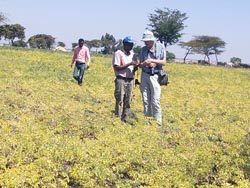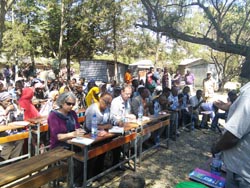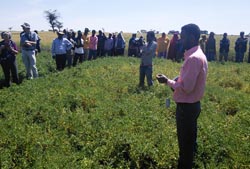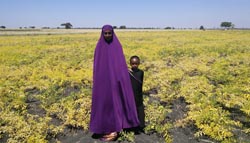Bale Zone is one of the target sites for implementation in Ethiopia where faba bean and chickpea legume crops are targeted under the South-East Public-Private Partnership cluster.
|
Adamu Zeleke, Socio-economics researcher and member of N2Africa project team at Sinana Agricultural Research Centre explaining on chickpea technology at Ato Nega Tibeb’s plot in Ebbisa Kebele, Ginnir Woreda |
A team of project leadership including Charlene McKoin, Bill & Melinda Gates Foundation, Siboniso Moyo, the DDG of International Livestock Research Institute (ILRI) Ethiopian Office and Ken Giller, Wageningen University visited chickpea technology dissemination activities which were being implemented on smallholder farmers contracted to the private commercial farm, Balegreen Spice and Grain Development Plc., as out-growers at Ginnir Woreda. During the field visit key partners representing various institutions participated (certified chickpea seed multipliers and suppliers, extension and mechanization services providers, private commercial farm, public agricultural research institute, a private chickpea grain exporting company and a domestic inoculant production private company). The field visit was co- organized with "Joint Partners Field Day Event" and there was an opportunity for the project leadership, donors and project country coordinators to interact and share concerns with beneficiary farmers and other cluster partners. |
Cluster partners and collaborators including Bale zone and Ginnir Woreda bureaus of agriculture (BoA), Woreda cooperative promotion and agricultural investment Offices, primary cooperatives, Oromia Agricultural Research Institute’s Sinana Agricultural Research Centre, Balegreen Spices and Grain Development (Balegreen) and farmers from the different project intervention Kebeles were represented at the event.
|
|
Left: Mrs Zehara Abdurahaman and her daughter on their chickpea plot explaining to the participants at Ebbisa Kebele, Ginnir Woreda.
Right: Prof Ken Giller and Dr Endalkachew Wolde-meskel examining chickpea in the field |
 |
Field visits were made to chickpea technology dissemination activities on out-grower farmers’ plots contracted to Balegreen for which N2Africa is supporting the cluster partners in terms of budget allocation, technical guidance, monitoring and evaluation processes and facilitation of the partnership processes to ensure sustainable access to knowledge, inputs and market to the smallholder farmers. Two Kabuli varieties of chickpea, i.e., ACOS Dubie and Arerti, with very good international market have been disseminated along with inoculants and fertilizers.
|
Back from the field visits, there was an intensive general discussion facilitated by project national team (Project country coordinator-Dr Endalkachew Wolde-meskel and Business Development Officer- Tamiru Amanu) and cluster partners (SARC Director-Seifudin Mehadi, Woreda BoA vice head-Mengistu Adare, and Balegreen General Manager- Million Bogale). Photo: Mrs Charlene McKoin (BMGF), Dr Siboniso Moyo (ILRI Ethiopia Director) and Prof Dr Ken Giller (WUR, N2Africa Project Director), from left to right, on general discussion. |
 |
Strengthening access to inputs including pesticides for bollworm, improved seeds and inoculants, and profitable market (particularly for the second Kabuli variety, Arerti) were the major points from the farmers.
On behalf of N2Africa and the visiting team from BMGF and ILRI, Prof Dr Ken Giller acknowledged the efforts already being made by the project and the partners. He concluded his remarks by emphasizing that the project will continue to support the smallholder farmers for which collaboration and support of government institutions, development and private partners will be very crucial.
Tamiru Amanu, N2Africa BDO, Ethiopia


